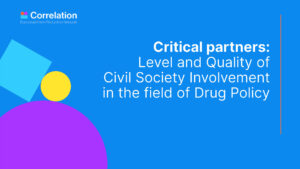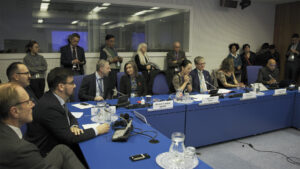While the Hungarian politicians, similarly to other populist forces in Europe, falsely claim that migrants brings disease, they ignore the evidence about what really works in stopping disease.
In an interview to a pro-government newspaper, Bence Rétvári, the Secretary of State for Public Administration of the Hungarian government, declared that “mass migration does not only pose risk in regard to terrorism, public security, the preservation of our culture or overburdening social care, but also for the whole public health system.” He backed this claim with two arguments. His first argument was that migration brings “huge extra expenditure” to the public health care system. His second argument was that migrants “endanger” Europe by bringing disease and infections. Both arguments are often used by populist politicians because they seem to be compelling to people who don’t know much about the subject. The only problem with these arguments is that they are not only unsubstantiated by epidemiological research, but are deemed to be wrong and dangerous beliefs by researchers.
A recent example is a scientific commission comprised of leading health experts, convened by the world’s most prestigious public health journal, The Lancet. The UCL-Lancet Commission published its report about the public health impact of migration in December last year. “We come to the conclusion that there is no evidence migrants are contributing to any harmful effects on the health of the countries. If anything, they are adding a lot of value,” said a member of this Commission to the press. According to the report, it is primarily the young and healthy people who undertake a risky journey to start a new life in another country and they have lower mortality and morbidity rates than the host societies in Europe. That means net benefits for the public health system in the ageing Europe. Most of the health damage migrants suffer from can be linked to stigma and discrimination; politicians should focus on breaking down these barriers instead of scaremongering.
According to a report published by the International Monetary Fund, each 1% increase of migrants in the adult population increases the gross domestic product (GDP) per person by up to 2% in advanced economies. In addition, migrants play an important role in filling job vacancies in the public health sector. For example, 37% of doctors in the UK gained their medical qualification in another country.
Mr. Rétvári in his interview refers to a certain “European Epidemiological Organisation” (sic), which warns us of “the rise of diseases that, thanks to vaccines, have been eliminated before.” His example is “the worrying increase in the number of new HIV infections”. This statement falsifies facts in three ways. First, an organisation with this name does not exist – it’s real name is the European Centre for Disease Control (ECDC). Second, Mr. Rétvári wrongly suggests a causal link between migration and diseases that can be prevented by vaccines. The ECDC reported outbreaks of these vaccine-preventable diseases (such as measles) in countries where there is a low level of vaccination among the general population. The situation is much worse in Romania, with low number of migrants, than for example in Germany or Sweden, with a high number of migrants and refugees. If we would like to blame something for these outbreaks we should blame poverty and pseudoscientific prejudices, not migrants.
And this is not only my view but that of the former director of ECDC and the current regional director of WHO, Zsuzsanna Jakab, who stated: “In spite of a common perception that there is an association between migration and the importation of infectious diseases, there is no systematic association. Communicable diseases are primarily associated with poverty. Refugees and migrants are exposed mainly to the infectious diseases that are common in Europe, independently of migration.”

And finally, Mr. Rétrvári is wrong to claim that HIV is a vaccine-preventable disease. Unlike for measles, scientists have not developed a vaccine for HIV yet. And unlike measles, HIV is only transmittable sexually or through the sharing of injecting equipment. According to recent research findings that were presented at the International AIDS Conference in Amsterdam this year, most migrants who live with HIV in Europe were infected in their home countries (this is true for those coming from Sub-Saharan Africa too). We know that migrants are more vulnerable to HIV infections than the general population – but this is because of marginalisation and stigmatisation, not because they culturally prefer taking more risks.
What Rétvári fails to mention is that with the help of antiviral drugs HIV can not only be made undetectable but also untransmittable. According to Sustainable Development Goals adopted by his government, we can only stop HIV by providing broad access to prevention and treatment, not by restricting migration. What is more, we know that by making repressive policies against vulnerable groups in society we stigmatise and marginalise these people and this fuels the global epidemic.
Access to this article is free - but to produce articles and videos is not. Drugreporter is a non-profit website that needs your support to provide you with high quality contents.
While the Secretary uses diseases for fear-mongering and incitement of hatred against a vulnerable section of society, he works for a government that has not only been ignoring but deliberately destroying the institutional system of disease prevention and treatment in Hungary in recent years. Hungary has no national HIV strategy and no adequate budget for HIV policies. Access to testing and counselling is shamefully low, as well as access to sexual education and HIV-prevention. The government abolished the National Institute of Epidemiology that had been monitoring diseases. Needle and syringe programs were closed down due to political attacks.
It is not surprising that in many Western European countries, where millions of migrants live, HIV prevalence is going down, while in Hungary, with almost no migrants, the number of new infections doubled in the past ten years. Due to low access to testing and counselling, the majority of people living with HIV do not even know about their status and only half of them receive treatment. If politicians really worry about death and disease they have to fight ignorance and prejudices, not feed them.
Peter Sarosi







